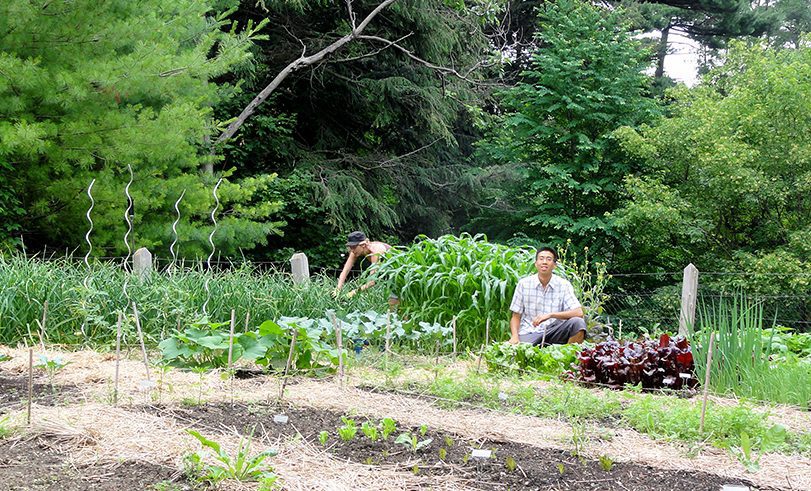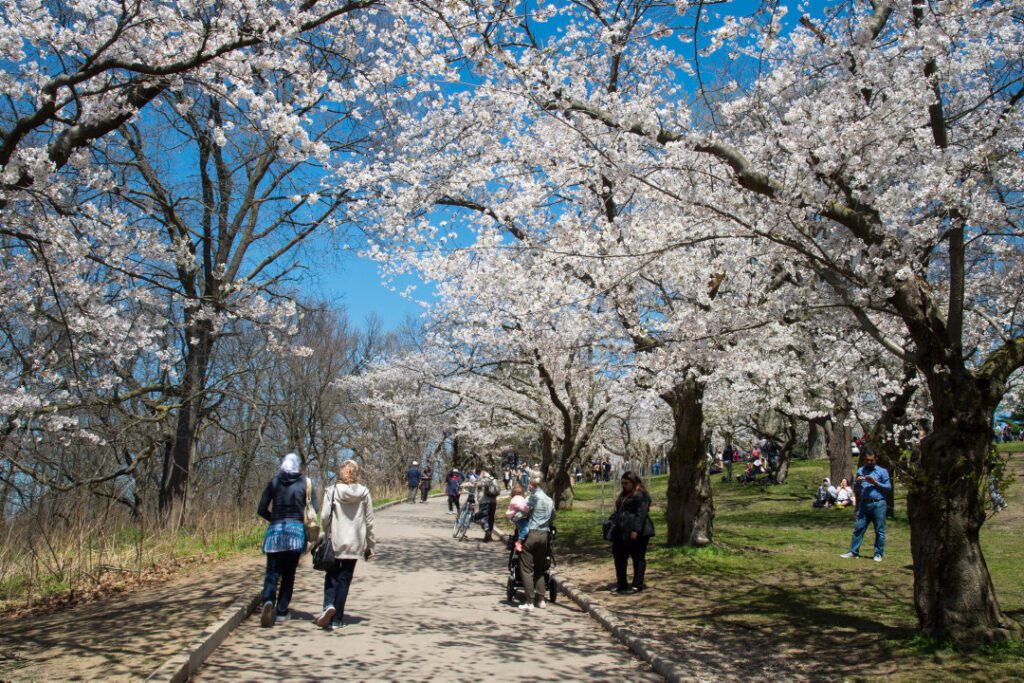There are many professional gardeners in Toronto who will cut your lawn, prune your lilacs, and weed the rose bed. But if it’s edibles you’re growing – whether outdoors, indoors, or in a greenhouse – then you might consider putting in a call to Young Urban Farmers.
Founded in 2009 by three recent graduates of Queen’s University’s Commerce program, the small but optimistic company works throughout the GTA, selling gardening supplies such as planters and organic fertilizer, while also providing the labour and expertise to help people to set up and maintain their own food gardens.
Chris Wong is the general manager of Young Urban Farmers, and the only one of the three original founders to still be involved in the company. A busy advocate of sustainable urban agriculture, Wong is also a co-founder of the Community Shared Agriculture organization Cultivate Toronto and served for several years on Toronto’s Youth Food Policy Council. Fortunately, I got in touch with him just before the busiest month of his year began.
Young Urban Farmers has been in operation for several years – how many people do you employ at this point?
The core team of Young Urban Farmers is still quite small. Essentially for this season, I’ve got a crew of two people who will be helping me do pretty much all of the gardening stuff, from setting up to watering and weeding and managing and taking care of the different plants.
Who hires Young Urban Farmers, and why?
There’s a number of reasons why people choose to hire me, and some of them include having that extra peace of mind and assurance from someone who has done this for many years that they are choosing the best gardening products, the best soil mix, and having it professionally planted.
The majority of our customers are people who want to be growing the food to add nutrients to their diet. People will choose to have a vegetable garden and grow their own food because it allows them to know exactly where their food is coming from. It allows them to understand that there’s no chemicals or pesticides being added into the garden, and have things as fresh as possible.
Some people do it to improve their health. Whether they have different health challenges, or simply want to improve their overall health and be in that state of so-called optimal health. There’s also food security. Last year, for example, I helped in a garden in a Toronto community housing building. I set up a garden for them. For them, sometimes having access to fresh, healthy food is a challenge; they might live in what’s known as food deserts, where having access to a grocery store that’s convenient and affordable is a challenge.
And so being able to have a garden that they can tend to, and foster that sense of community as well as to improve their health and nutrition, it’s all of those different factors on the checklist of why people may want to have a garden.
Are all of your clients private individuals growing food for their own consumption?
I’ve done some gardens for different restaurants and hotels who wanted to incorporate the food into their different services, whether it’s catering, or the banquet arm of a hotel, for example. I have a customer near Eglinton West subway station and they grow a tonne of food and they like to share this with their friends and neighbours and just be that local champion.
Do you have any advice for people who are thinking about hiring Young Urban Farmers?
I would say for most people, the first step – and this is geared more towards an outdoor garden – the first step is to look at the sun and the shade, and think of how you want to choose the sunniest area possible.
There’s a direct correlation between the hours of direct sun and how well the plants do, so you want a place with at least four hours of direct sun – perhaps six or eight hours of direct sun would be even better, but with a limited amount of sun you can still have some great herbs and other things that can tolerate a little less sun.
What are some of the more common gardening mistakes you run into?
Yeah, so, number one, people often plant things too closely together, especially when it comes to tomatoes and zucchini and other large plants. When it comes to doing the planting, the spacing is very important, so if you plant too close together, then the plants aren’t going to reach their full potential, and you will not be able to maximize your yield.
You can actually increase the risk of different fungal and bacterial diseases because they lack air flow and the plants are too tightly packed together. And if they’re too far away then you’re going to potentially be dealing with more weeds and other issues in terms of having too much open space for the different plants.
And number two, another common challenge that people run into is not building up and improving the soil that they’re working and growing in. So think of the soil like the foundation of a building. If we use that analogy, we have a strong foundation then you’ll have strong healthy plants.
What are the hardest parts of your job?
From my perspective, one of the most challenging things is managing the planting season in May. There’s always more things to do, and not enough hours in the day to get things planted at an appropriate time.
On the flip side, what are some of your favourite parts of Young Urban Farmers’ work?
One of my favourite things is that it always provides new and interesting challenges. I get to meet and work with a wide range of different people, and the job is never the same from year to year. So we have mother nature and the general climate and weather, we have the different spaces that we’re working in, different site conditions, different soil conditions…
And in addition, there’s always opportunities to experiment and test out new varieties of the crop. So for example, a couple years ago I started growing chickpeas, and that’s not a very common thing that people think of when it comes to gardening and growing. But it’s a beautiful plant, and it really accents a garden and provides a nice conversation starter for people who want to sort of extend their range.
What area do you work in?
I go all over Toronto and even outside of Toronto to the GTA for the garden set-up. When we started in 2009 we focussed exclusively on the Mid-town neighbourhood, so around Yonge and Lawrence, Yonge and Eglinton type of area, but like I said, we’ve expanded to all across Toronto and the GTA.
I have people up in Richmond Hill, I have some people even up in Newmarket who call me to come and help them with their garden, and people out in Pickering, out in Mississauga, Burlington. I had a couple people out in Hamilton last year. It takes me all over the GTA, and that’s one of the nice things; to be able to see all of what Ontario has to offer.
Given the Canadian climate, how many months a year are you able to operate?
I start my seeds in March, there’s a greenhouse that I rent space in near Newmarket. Depending on the weather, the first time we do some planting outside is typically in April, and then in May we’re planting still, and in terms of outdoor gardens we go up until October generally, or until frost kills off most of the plants.
So do you take the winter off, or are there preparations to be made for the next year?
Oh yes. In winter there’s a lot of planning and research that goes into that season. And so, generally starting February, that’s when the trade shows and events – for example, Seedy Saturday and Canada Blooms get started. And it’s also doing some pre-orders. So for people who are a little bit more organized, and want to get everything lined up, we start taking pre-orders in January. And so that’s part of what the winter looks like for me.
Is there anything that you’d like to see changed in Toronto’s approach to urban agriculture?
Yeah. I would say that there’s a lot of great initiatives already underway, whether it’s the gardening in the hydro corridors or the other work that the Toronto Food Policy Council and the Toronto Food Strategy is working on. One thing that I would be really excited to see happen is to have backyard chickens be allowed officially for people in the city. I think that it compliments backyard farming and gardening very closely. So combining those different elements, I think, could be a great way in which we can get more food-related activities happening in the city.

YUF helped in the planning and setup of this rooftop garden growing a variety of vegetables in EarthBoxes.
Since this is Toronto, I’m assuming you have a technique for keeping racoons from eating people’s crops?
Racoons are definitely a challenge for many people. There are two main things that I recommend. Number one is crop selection. You’re going to think about growing things in the onion family – so that would be leeks, shallots, your green onions, garlic – those are generally not attractive to racoons and most animals and insects.
Number two is to use a motion-activated sprinkler. So this is a device you attach to your hose. It runs off a battery, and when an animal crosses the sensor it gets triggered, and it sends a burst of water to scare away different animals. And one of the keys to that is to get it set up and installed from day one when you plant your garden.
Besides racoons, what are some of the gardening hurdles one can encounter in Toronto?
Depending on your neighbourhood you might have a lot of mature trees, so finding places where there’s enough sun to grow your tomatoes and cucumbers could be a challenge. So that’s one hurdle.
Number two; some people just don’t have that confidence or skill or the knowledge to tend to their garden. So that’s where someone like me can come in. But also at the same time, we have great resources online for people who want to take that initiative to learn themselves, there’s that option as well.
Would you say there are any perks or advantages to gardening in Toronto?
I would say Toronto is a very diverse, multi-cultural society, and so that translates into a lot of different gardens, and different crops that get grown. So; diverse people that I help grow different things like bitter melon and okra. And of course, there are Chinese vegetables like bok choy and daikon radish. It’s nice to have people with some of those cultural heritages, to help them to connect with that aspect of their culture through the garden. That’s one advantage of being in Toronto; the diversity of the people and the cultures that they bring with them.
Title photo by Tujawellness.com
JN00KI





